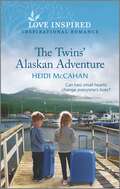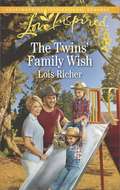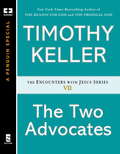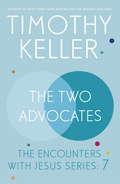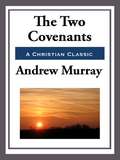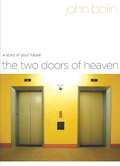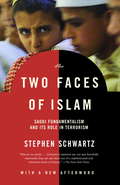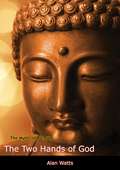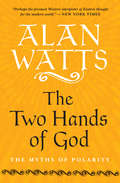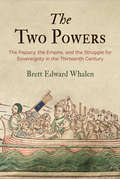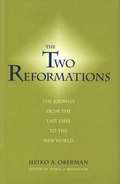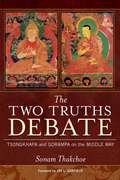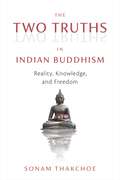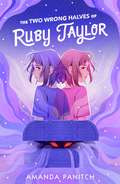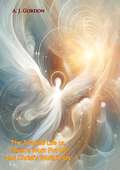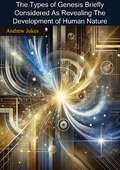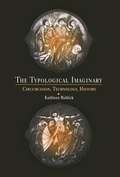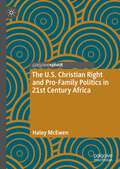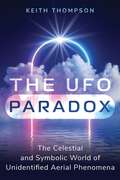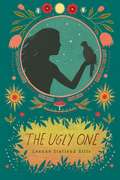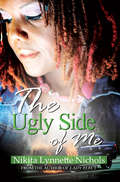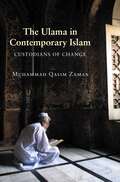- Table View
- List View
The Twin Who Wins (Cloverleaf #1)
by Sharon Lené Yorks"I'm glad to finally see a story about barrel racers, and a writer who can capture the true essence of rodeo." - Sherry Cervi, 2-time W.P.R.A. World Champion Barrel Racer.
The Twins' Alaskan Adventure: An Uplifting Inspirational Romance (Home to Hearts Bay #2)
by Heidi McCahanSometimes it takes two good reasons To give love a second chance… The moment the sweet-faced twins arrive in Alaska, Eliana Madden is smitten. They almost make her forget that their father, Tate Adams, broke her heart. Now Eliana has agreed to help Tate take care of the twins for the summer. Could this be the start of healing the rift between their families…and the beginning of a new adventure for them all?From Love Inspired: Uplifting stories of faith, forgiveness and hope.Home to Hearts Bay Book 1: An Alaskan SecretBook 2: The Twins' Alaskan Adventure
The Twins' Family Wish
by Lois RicherBachelor Father Working at a day care center, teacher Penny Stern knew she'd bond with the children-but she never expected to fall for adorable four-year-old twins or their handsome uncle. Her heart is in danger when Rick Granger asks for a helping hand. Named guardian to the twins after his sister's death, the confirmed bachelor is in way over his head. And when his construction company is in danger of falling behind on a job at Wranglers Ranch, the single dad realizes he needs a full-time mom for the twins. Penny wants happily-ever-after, but Rick is offering a marriage in name only. Could two wily twins and one heartfelt wish help make them a real family?
The Two Advocates
by Timothy KellerThe Gospels are full of encounters that made a profound impact on those who spoke with Jesus Christ. In his Encounters with Jesus series, Timothy Keller, pastor of New York's Redeemer Presbyterian Church and New York Times-bestselling author of The Reason for God, shows how those encounters can still have a deep effect on us today. The Last Supper is known for the breaking of the bread and pouring of the wine. But in The Two Advocates, Keller explores the central point of Jesus' final discourse with his disciples during their last meal. Keller reveals how Jesus describes himself and the Holy Spirit as our advocates before God, and why their advocacy can secure our peace. This and the other nine in the series make up the complete Encounters With Jesus: Unexpected Answers to Life's Biggest Questions.
The Two Advocates: The Encounters With Jesus Series: 7
by Timothy KellerThe Gospels are full of encounters that made a profound impact on those who spoke with Jesus Christ. In his Encounters with Jesus series, Timothy Keller, pastor of New York's Redeemer Presbyterian Church and New York Times-bestselling author of The Reason for God, shows how those encounters can still have a deep effect on us today. The Last Supper is known for the breaking of the bread and pouring of the wine. But in The Two Advocates, Keller explores the central point of Jesus' final discourse with his disciples during their last meal. Keller reveals how Jesus describes himself and the Holy Spirit as our advocates before God, and why their advocacy can secure our peace.This and the other nine in the series make up the complete Encounters With Jesus: Unexpected Answers to Life's Biggest Questions.
The Two Churches: Catholicism and Capitalism in the World System
by Michael L. BuddeThe single most important change now well under way within Catholicism is its transition from a First World to a Third World entity. How this enormous shift will affect the Catholic church's role in the world economy is the subject of Michael L. Budde's book, the first world systems study of the mutual interaction of religion and political economy in the 1990s.Budde's argument here is twofold. He contends that world Catholicism, led by its Third World majority (most notably in Latin America), will continue to develop in an increasingly anticapitalist direction; and he suggests that once-dominant First World Catholic churches (exemplified by the U.S. Catholic church), are poorly placed to respond in solidarity with their coreligionists from the Third World.Covering a wide range of theoretical and substantive matters, The Two Churches examines religion as a source of both social legitimation and social rebellion. It demonstrates the importance of ecclesiology, a branch of theology dealing with "theories of the church," and it highlights the effect of capitalism on world Catholicism, as well as the latter's influence on the development of the capitalist order.In his original, far-reaching analysis of the Catholic church's role in world affairs, Budde revises current views of religious institutions as subordinate social phenomena. By relating developments in the world political economy to material conditions in the Third World and in turn to the practice of Catholicism, he reveals how the Catholic church functions as a worldwide institution. He also shows how core-periphery conflicts within the church affect transnational capitalism.As the Third World becomes more and more volatile, and as its relations with the First World further complicate the politics of the Catholic church, the questions addressed in The Two Churches demand attention with increasing urgency. Timely, thoughtful, and lucid, this book will inform and enhance our understanding of this complex, pressing issue.
The Two Covenants
by Andrew MurrayThis book is a series of eighteen meditations contrasting the Old Covenant with the New Covenant. Murray shows us the blessings God has given us, along with the conditions necessary for the full and continual experience of those.
The Two Doors of Heaven: A Story of Your Future
by John BolinIn this evangelistic book, John Bolin follows a fiction-meets-nonfiction approach to lead readers to a surprising encounter with Jesus-as they ponder the reality of heaven and how to get there. The Two Doors of Heaven begins with an extended story of Jack, a guy next door kind of person who is killed in a freak accident while sitting at a coffee shop. He awakes in the afterlife and is taken on a journey toward his moment of judgment before God. Along the way he meets several people who help him unravel life's meaning. The second part of the book is like a personal conversation with the author. Bolin anticipates the questions and reflections readers have and helps them explore the real issues faced in regard to the two doors of heaven. "Every one of us has a reason- for what we do, for where we end up." Journey with a man named Jack to the other side of eternity. After dying in a freak accident, he enters the afterlife with four others. In this new, hyper-real existence, they each see a vivid replay of their lives, complete with answers to haunting questions. Then comes the startling truth about what happens next. Two doors appear. One leads up. The other down. Which will it be? Jack's inevitable destiny echoes the choices he made on earth. What if you could control where you're headed? Maybe you can find out what the two doors of heaven reveal for you.
The Two Faces of Islam
by Stephen SchwartzSince its formation in 1932, Saudi Arabia has been ruled by two interdependent families. The Al Sa'uds control politics and the descendants of Ibn Abd al-Wahhab impose Wahhabism--a violent, fanatical perversion of the pluralistic Islam practiced by most Muslims. Stephen Schwartz argues that Wahhabism, vigorously exported with the help of Saudi oil money, is what incites Palestinian suicide bombers, Osama bin Laden, and other Islamic terrorists throughout the world.Schwartz reveals the hypocrisy of the Saudi regime, whose moderate facade conceals state-sponsored repression and terrorism. He also raises troubling questions about Wahhabi infiltration of America's Islamic community and about U.S. oil companies sanitizing Saudi Arabia's image for the West. This sharp analysis and eye-opening expose illuminates the background to the September 11th terrorist attacks and offers new approaches for U.S. policy toward its closest ally in the Middle East.From the Trade Paperback edition.
The Two Hands of God: The Myths of Polarity
by Alan Watts"The Two Hands of God explores the human experience of polarity, a condition in which seemingly opposite qualities form part of a larger whole. The author illustrates the ways that different cultures express the concept of polarity through the symbolic language of myth, literature, and art"-Print ed.
The Two Hands of God: The Myths of Polarity
by Alan WattsThe forgotten book on world mythology by Alan Watts Alan Watts is today remembered as a trailblazing interpreter of Eastern philosophy, but The Two Hands of God reveals a different side of his multifaceted genius. In this ambitious work, Watts takes readers on a fascinating journey through the mythology of China, Egypt, India, the Middle East, and medieval Europe. His theme is the human experience of polarity, a condition in which opposing qualities define and complement each other. Light cannot exist without darkness, good cannot exist without evil, and male cannot exist without female. Chinese philosophy expresses this idea of universal polarity with the concepts of yin and yang, while other cultures express it through the symbolic language of myth, literature, and art. Watts illustrates the way great sages and artists across time have seen beyond the apparent duality of the universe to find a deeper unity that transcends and embraces everything.
The Two Powers: The Papacy, the Empire, and the Struggle for Sovereignty in the Thirteenth Century (The Middle Ages Series)
by Brett Edward WhalenHistorians commonly designate the High Middle Ages as the era of the "papal monarchy," when the popes of Rome vied with secular rulers for spiritual and temporal supremacy. Indeed, in many ways the story of the papal monarchy encapsulates that of medieval Europe as often remembered: a time before the modern age, when religious authorities openly clashed with emperors, kings, and princes for political mastery of their world, claiming sovereignty over Christendom, the universal community of Christian kingdoms, churches, and peoples.At no point was this conflict more widespread and dramatic than during the papacies of Gregory IX (1227-1241) and Innocent IV (1243-1254). Their struggles with the Hohenstaufen Emperor Frederick II (1212-1250) echoed in the corridors of power and the court of public opinion, ranging from the battlefields of Italy to the streets of Jerusalem. In The Two Powers, Brett Edward Whalen has written a new history of this combative relationship between the thirteenth-century papacy and empire. Countering the dominant trend of modern historiography, which focuses on Frederick instead of the popes, he redirects our attention to the papal side of the historical equation. By doing so, Whalen highlights the ways in which Gregory and Innocent acted politically and publicly, realizing their priestly sovereignty through the networks of communication, performance, and documentary culture that lay at the unique disposal of the Apostolic See.Covering pivotal decades that included the last major crusades, the birth of the Inquisition, and the unexpected invasion of the Mongols, The Two Powers shows how Gregory and Innocent's battles with Frederick shaped the historical destiny of the thirteenth-century papacy and its role in the public realm of medieval Christendom.
The Two Reformations: The Journey from the Last Days to the New World
by Heiko A. Oberman Donald WeinsteinIn this last collection of his vital, controversial, and accessible writings, Oberman seeks to liberate and broaden our understanding of the European Reformation, from its origins in medieval philosophy and theology through the Puritan settlers who brought Calvin's vision to the New World. Ranging over many topics, he finds fascinating connections between aspects of the Reformation and twentieth-century history and thought--most notably the connection to Nazism and the Holocaust.
The Two Truths Debate: Tsongkhapa and Gorampa on the Middle Way
by Sonam Thakchoe Jay GarfieldAll lineages of Tibetan Buddhism today claim allegiance to the philosophy of the Middle Way, the exposition of emptiness propounded by the second-century Indian master Nagarjuna. But not everyone interprets it the same way. A major faultline runs through Tibetan Buddhism around the interpretation of what are called the two truths--the deceptive truth of conventional appearances and the ultimate truth of emptiness. An understanding of this faultline illuminates the beliefs that separate the Gelug descendents of Tsongkhapa from contemporary Dzogchen and Mahamudra adherents. The Two Truths Debate digs into the debate of how the two truths are defined and how they are related by looking at two figures, one on either side of the faultline, and shows how their philosophical positions have dramatic implications for how one approaches Buddhist practice and how one understands enlightenment itself.
The Two Truths in Indian Buddhism: Reality, Knowledge, and Freedom
by Sonam ThakchoeAn insightful and illuminating survey of key insights into one of the most foundational and profound topics in Buddhist thought.In this clear and exemplary approach to one of the core philosophical subjects of the Buddhist tradition, Sonam Thakchoe guides readers through the range of Indian Buddhist philosophical schools and how each approaches the two truths: ultimate truth and conventional truth. In this presentation of philosophical systems, the detailed argumentations and analyses of each school&’s approach to the two truths are presented to weave together the unique contributions each school brings to supporting and strengthening a Buddhist practitioner&’s understanding of reality. The insights of the great scholars of Indian Buddhist history—such as Vasubandhu, Bhavaviveka, Kamalashila, Dharmakirti, Nagarjuna, and Chandrakirti—are illuminated in this volume, with profound implications for the practice and views of modern practitioners and scholars. The Vaibhashika, Sautrantika, Yogachara, and Madhyamaka schools provide a framework for a continuum of philosophical debate that is far more interrelated, and internally complex, than one may presume. Yet we see how the schools build upon the findings of one another, leading from a belief in the realism of external phenomena to the relinquishment of any commitment to realism of either external or internal realities. This fascinating movement through philosophical approaches leads us to see how the conventional and ultimate—dependent arising and emptiness—are twin aspects of a single reality.
The Two Wrong Halves of Ruby Taylor
by Amanda PanitchFunny and poignant, Amanda Panitch's new middle-grade novel The Two Wrong Halves of Ruby Taylor is an exploration of mixed families, identity, hundred-year-old curses, and the terrifying challenge of standing up for yourself against your loved ones.Of her two granddaughters, Grandma Yvette clearly prefers Ruby Taylor's perfect—and perfectly Jewish—cousin, Sarah. They do everything together, including bake cookies and have secret sleep overs that Ruby isn't invited to. Twelve-year-old Ruby suspects Grandma Yvette doesn't think she's Jewish enough. The Jewish religion is matrilineal, which means it's passed down from mother to child, and unlike Sarah, Ruby’s mother isn’t Jewish.But when Sarah starts acting out--trading in her skirts and cardigans for ripped jeans and stained t-shirts, getting in trouble at school--Ruby can’t help but be somewhat pleased. Then Sarah suddenly takes things too far, and Ruby is convinced Sarah is possessed by a dybbuk, an evil spirit... that Ruby may or may not have accidentally released from Grandma Yvette's basement. Ruby is determined to save her cousin, but a dybbuk can only be expelled by a "pious Jew." If Ruby isn't Jewish enough for her own grandmother, how can she possibly be Jewish enough to fight a dybbuk?Amanda Panitch writes with a humorous, irresistible, and authentic voice. This character-driven story with a magic twist about speaking up and finding your place in the world is for fans of Erin Entrada Kelly, Stacey McAnulty, and Greg Howard.
The Twofold Life or, Christ's Work For Us and Christ's Work in Us
by A. J. Gordon"A. J. Gordon's The Twofold Life or, Christ's Work For Us and Christ's Work in Us" is an illuminating and deeply spiritual examination of the dual aspects of Christ's redemptive work in the life of a believer. A. J. Gordon, a highly respected 19th-century pastor and theologian, masterfully articulates the profound theological truths of Christ's external and internal work in this enduring classic.In "The Twofold Life," Gordon explores the complementary and inseparable aspects of Christ's work. He begins by delving into "Christ's Work For Us," emphasizing the foundational truths of the gospel: Christ's atoning sacrifice, justification, and the believer's position in Christ. Gordon provides a rich and detailed exposition of the significance of Christ's death and resurrection, underscoring the believer's assurance of salvation and the transformative power of Christ's finished work on the cross.Transitioning to "Christ's Work in Us," Gordon addresses the internal, sanctifying work of the Holy Spirit in the believer's life. He explains how Christ's life, character, and power are manifested within the believer, leading to spiritual growth and maturity. Gordon discusses the process of sanctification, the indwelling presence of the Holy Spirit, and the believer's ongoing transformation into Christlikeness.Throughout the book, Gordon employs a pastoral and accessible writing style, making profound theological concepts understandable and applicable to everyday Christian living.This book is an invaluable resource for theologians, pastors, and laypeople seeking a deeper understanding of the Christian faith. "The Twofold Life or, Christ's Work For Us and Christ's Work in Us" remains a timeless and inspirational work that continues to encourage and edify believers, guiding them towards a richer and more vibrant relationship with their Savior.
The Types of Genesis Briefly Considered As Revealing The Development of Human Nature: As Revealing The Development Of Human Nature
by Andrew JukesThe Types of Genesis Briefly Considered As Revealing The Development of Human Nature by Andrew Jukes is a profound and insightful exploration of the Book of Genesis, uncovering the rich typological and symbolic meanings that reveal the development and transformation of human nature. In this illuminating work, Jukes delves into the lives and stories of key biblical figures, interpreting their experiences as reflections of the spiritual and moral journey of humanity.Andrew Jukes, a respected theologian and biblical scholar, presents a detailed examination of Genesis, focusing on the typological significance of its characters and events. He argues that the narratives in Genesis are not merely historical accounts but also profound allegories that illustrate the stages of human development and the path to spiritual maturity. From Adam and Eve to Noah, Abraham, Isaac, Jacob, and Joseph, Jukes elucidates how their lives and trials embody universal truths about human nature and our relationship with God.Through his thorough and thoughtful analysis, Jukes reveals how the types and shadows in Genesis point to deeper spiritual realities and divine principles. He demonstrates how these ancient stories continue to speak to us today, offering timeless lessons on faith, obedience, redemption, and transformation. By understanding the typological significance of Genesis, readers can gain a deeper appreciation of God's plan for humanity and the ongoing process of spiritual growth and renewal.The Types of Genesis Briefly Considered As Revealing The Development of Human Nature is an essential read for theologians, biblical scholars, and anyone interested in the deeper meanings of Scripture. Jukes' eloquent writing and profound insights make this book a valuable resource for those seeking to understand the spiritual dimensions of the Bible and the divine pattern of human development.This book offers a fresh perspective on the Book of Genesis, encouraging readers to look beyond the surface and discover the rich typological treasures that reveal God's unfolding plan for the redemption and transformation of human nature. Andrew Jukes' work continues to inspire and enlighten, providing a timeless guide for spiritual growth and understanding.
The Typological Imaginary
by Kathleen BiddickIn this book Kathleen Biddick investigates the fate of the enduring timelines fabricated by early Christians to distinguish themselves from their Jewish neighbors. Ranging widely across the history of text, technology, and book art, she relates three interwoven stories: the Christians' translation of circumcision into a graphic problem of writing on the heart; the temporal construction of Christian notions of history based on the binary supersession of an Old Testament past by the present of a new dispensation; and the traumatic repetition of the graphic cutting off of Christians from Jews in academic history and anthropology.Moving beyond well-studied theological polemics, Biddick works from the relatively unfamiliar vantage point of the graphic technologies used in medieval and early modern texts and print sources, from maps to trial transcripts to universal histories. Addressing current concerns about the posthuman condition by linking them to a deeper genealogy of disembodiment at the technological heart of imaginary fantasies, she argues that such supersessionary practices extend to contemporary psychoanalytic and postcolonial texts, even as they propose alternative ways of thinking about memory and temporality. Crucial to Biddick's study is the ethical challenge of unbinding the typological imaginary, not in order to disavow theological difference but rather to open up the encounter between Christian and Jew to less deadening teleological readings.Making a significant contribution to the large debate over the transition from "scriptural" to "scientific" culture in Europe, The Typological Imaginary also succeeds in shedding light on the centrality of Jews to medieval and Enlightenment history.
The U.S. Christian Right and Pro-Family Politics in 21st Century Africa
by Haley McEwenThis book will address and uncover the role of US Christian Right ‘pro-family’ groups in mobilizing counter-movements against LGBTIQ+ human rights, reproductive justice, and sexuality education in Africa, and will intervene in the tendency to exceptionalize Africa as a ‘homophobic continent’ following the surge in homophobic and transphobic legislation, hate speech, and violence in recent years. The author employs the lens of decoloniality in an intersectional manner to unpack the multiple forms of hierarchy and oppression that the concept of the nuclear family has historically worked to naturalize in the interests of capitalism, Christo-normativity, and a world system dominated and controlled by the global north. Proceeding from the historical geopolitical context informing nuclear family idealization, the analysis then presents a critical discussion of contemporary pro-family discourses, showing that pro-family narratives that universalize and politicize the notion of ‘family’ are not only constituting agendas that erode LGBTIQ+ and reproductive justice, but reinforce an international order that privileges Euro-American interests despite pro-family claims that their agendas are anti-imperialist. This book will be of interest to scholars in gender, sexuality, and queer studies; postcolonial studies; and international relations.
The UFO Paradox: The Celestial and Symbolic World of Unidentified Aerial Phenomena
by Keith Thompson• Looks at witnesses&’ reports as well as the theories of skeptics, revealing how UFOs represent a call from the cosmos to expand our understanding of reality• Explores UFO encounters against the backdrop of visionary experience—angelic visitations, near-death experiences, shamanic journeys, and religious miracles• Shares the author&’s UFO discussions with late Harvard psychiatrist John Mack, philanthropist Laurance S. Rockefeller, and astronaut Edgar MitchellIn case after case related to UFO encounters and other unknown aerial phenomena (UAP), the same impasse is reached: testimony from witnesses on one side, dismissive responses from the authorities on the other. In the fertile void of this deadlock, however, lie extraordinary possibilities about the nature of mind and matter, spirit and soul, transforming the UFO into a celestial, metaphysical event.Focusing on the possibilities found by exploring both sides of the UFO debate, veteran UFO observer and reporter Keith Thompson shares profound insights and experiences from his several decades of research, revealing that the UFO phenomenon is decidedly real yet perhaps not what either side of the debate expects. He looks at UFOs as a genuine unknown, from outer space or manifesting from hidden dimensions, as well as the theories of skeptics and debunkers who insist that UFOs can be explained as hoaxes, hallucinations, or misidentified phenomena. He explores the modern flying saucer era against the backdrop of visionary experience—angelic visitations, near-death experiences, shamanic journeys, religious miracles, and fairy tales—and shows how UFOs are simultaneously physical and spiritual, presenting a form of intelligence capable of altering the perceptions of witnesses.Chronicling his own investigations into the UFO mystery, the author details how he introduced the late Harvard psychiatrist John Mack to accounts of alien abduction and how he was invited by philanthropist Laurance S. Rockefeller to lobby then-president Bill Clinton to disclose government-held UFO information. Sharing stories from his friendship with astronaut Edgar D. Mitchell, among others, the author recounts discussions on how best to interpret UFOs and non-ordinary phenomena of various kinds.Thompson reveals how the UFO phenomenon ultimately represents a call from the cosmos for humanity to open to greater dimensions of reality and recognize that our understanding of the universe is still far from complete.
The Ugly One
by Leanne Statland EllisI had always been ugly, as far back as I could remember. Micay has a deep scar that runs like a river from her right eye to her lip. The boys in her Incan village bully her because of it, and most of the adults ignore her. So she keeps to herself and tries to hide the scar with her long hair, drawing comfort from her family and her faith in the Sun God, Inti. Then a stranger traveling from his jungle homeland to the Sacred Sun City at Machu Picchu gives her a baby macaw, and the path of her life changes. Perhaps she isn't destined to be the Ugly One forever. Vivid storytelling and rich details capture the life and landscape of the Incan Empire as seen through the eyes of a young girl who is an outsider among her own people.
The Ugly One
by Leanne Statland EllisI had always been ugly, as far back as I could remember.Micay has a deep scar that runs like a river from her right eye to her lip. The boys in her Incan village bully her because of it, and most of the adults ignore her. So she keeps to herself and tries to hide the scar with her long hair, drawing comfort from her family and her faith in the Sun God, Inti. Then a stranger traveling from his jungle homeland to the Sacred Sun City at Machu Picchu gives her a baby macaw, and the path of her life changes. Perhaps she isn’t destined to be the Ugly One forever. Vivid storytelling and rich details capture the life and landscape of the Incan Empire as seen through the eyes of a young girl who is an outsider among her own people.
The Ugly Side of Me
by Nikita Lynnette NicholsLess than three weeks from the moment 34-year-old Rhapsody Blue first set her eyes on 21-year-old Malcolm Washington, her life has been turned upside down. It was lust at first sight, and Rhapsody isn't going to let young Malcolm leave her presence without a promise to fulfill her fantasy.Malcolm had no idea when he accepted Rhapsody's invitation to her bedroom that he was selling his soul to the devil. Malcolm thinks he can bed Rhapsody and simply walk away, but she is not one to settle for a one night stand. Rhapsody goes to desperate measures to keep her cub extremely close to her.Gifting Malcolm a very expensive SUV, filling his belly with home cooked meals and funding a trip to Cancun are just a few of the tactics that Rhapsody uses to ensure that Malcolm spends his nights in her bed and no one else's. However, when Rhapsody finds a mysterious package on her doorstep containing proof of Malcolm's betrayal and deception, she seeks revenge and seals her own fate.
The Ulama in Contemporary Islam: Custodians of Change (Princeton Studies in Muslim Politics #38)
by Muhammad Qasim ZamanFrom the cleric-led Iranian revolution to the rise of the Taliban in Afghanistan, many people have been surprised by what they see as the modern reemergence of an antimodern phenomenon. This book helps account for the increasingly visible public role of traditionally educated Muslim religious scholars (the `ulama) across contemporary Muslim societies. Muhammad Qasim Zaman describes the transformations the centuries-old culture and tradition of the `ulama have undergone in the modern era--transformations that underlie the new religious and political activism of these scholars. In doing so, it provides a new foundation for the comparative study of Islam, politics, and religious change in the contemporary world. While focusing primarily on Pakistan, Zaman takes a broad approach that considers the Taliban and the `ulama of Iran, Egypt, Saudi Arabia, India, and the southern Philippines. He shows how their religious and political discourses have evolved in often unexpected but mutually reinforcing ways to redefine and enlarge the roles the `ulama play in society. Their discourses are informed by a longstanding religious tradition, of which they see themselves as the custodians. But these discourses are equally shaped by--and contribute in significant ways to--contemporary debates in the Muslim public sphere. This book offers the first sustained comparative perspective on the `ulama and their increasingly crucial religious and political activism. It shows how issues of religious authority are debated in contemporary Islam, how Islamic law and tradition are continuously negotiated in a rapidly changing world, and how the `ulama both react to and shape larger Islamic social trends. Introducing previously unexamined facets of religious and political thought in modern Islam, it clarifies the complex processes of religious change unfolding in the contemporary Muslim world and goes a long way toward explaining their vast social and political ramifications.

